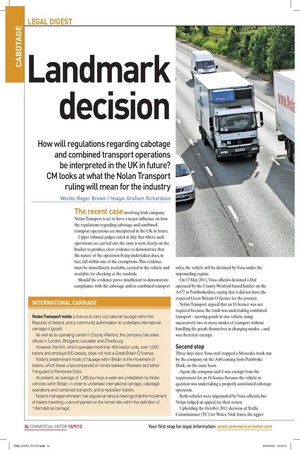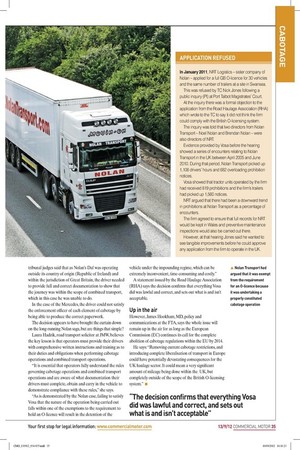Landmark decision
Page 20

Page 21

If you've noticed an error in this article please click here to report it so we can fix it.
How will regulations regarding cabotage and combined transport operations be interpreted in the UK in future? CM looks at what the Nolan Transport ruling will mean for the industry
Words: Roger Brown / Image: Graham Richardson The recent case involving Irish company Nolan Transport is set to have a major inluence on how the regulations regarding cabotage and combined transport operations are interpreted in the UK in future.
Upper tribunal judges ruled in July that where such operations are carried out, the onus is now clearly on the haulier to produce clear evidence to demonstrate that the nature of the operation being undertaken does, in fact, fall within one of the exemptions. This evidence must be immediately available, carried in the vehicle and available for checking at the roadside.
Should the evidence prove insuficient to demonstrate compliance with the cabotage and/or combined transport rules, the vehicle will be detained by Vosa under the impounding regime.
On 17 May 2011, Vosa oficials detained a Daf operated by the County Wexford-based haulier on the A477 in Pembrokeshire, saying that it did not have the required Great Britain O-licence for the journey.
Nolan Transport argued that an O-licence was not required because the truck was undertaking combined transport – moving goods in one vehicle, using successively two or more modes of transport without handling the goods themselves in changing modes – and was therefore exempt.
Second stop
Three days later, Vosa staff stopped a Mercedes truck run by the company on the A40 coming from Pembroke Dock, on the same basis.
Again, the company said it was exempt from the requirement for an O-licence because the vehicle in question was undertaking a properly constituted cabotage operation.
Both vehicles were impounded by Vosa oficials, but Nolan lodged an appeal for their return.
Upholding the October 2011 decision of Trafic Commissioner (TC) for Wales, Nick Jones, the upper tribunal judges said that as Nolan’s Daf was operating outside its country of origin (Republic of Ireland) and within the jurisdiction of Great Britain, the driver needed to provide full and correct documentation to show that the journey was within the scope of combined transport, which in this case he was unable to do.
In the case of the Mercedes, the driver could not satisfy the enforcement oficer of each element of cabotage by being able to produce the correct paperwork.
The decision appears to have brought the curtain down on the long-running Nolan saga, but are things that simple?
Laura Hadzik, road transport solicitor at JMW, believes the key lesson is that operators must provide their drivers with comprehensive written instructions and training as to their duties and obligations when performing cabotage operations and combined transport operations.
“It is essential that operators fully understand the rules governing cabotage operations and combined transport operations and are aware of what documentation their drivers must complete, obtain and carry in the vehicle to demonstrate compliance with these rules,” she says.
“As is demonstrated by the Nolan case, failing to satisfy Vosa that the nature of the operation being carried out falls within one of the exemptions to the requirement to hold an O-licence will result in the detention of the vehicle under the impounding regime, which can be extremely inconvenient, time-consuming and costly.” A statement issued by the Road Haulage Association (RHA) says the decision conirms that everything Vosa did was lawful and correct, and sets out what is and isn’t acceptable.
Up in the air
However, James Hookham, MD, policy and communications at the FTA, says the whole issue will remain up in the air for as long as the European Commission (EC) continues its call for the complete abolition of cabotage regulations within the EU by 2014.
He says: “Removing current cabotage restrictions, and introducing complete liberalisation of transport in Europe could have potentially devastating consequences for the UK haulage sector. It could mean a very signiicant amount of mileage being done within the UK, but completely outside of the scope of the British O-licensing system.” n
INTERNATIONAL CARRIAGE
Nolan Transport holds a licence to carry out national haulage within the Republic of Ireland, and a community authorisation to undertake international carriage of goods.
As well as its operating centre in County Wexford, the company has sales offices in London, Bridgend, Leicester and Cherbourg.
However, the firm, which operates more than 450 tractor units, over 1,000 trailers and employs 500 people, does not hold a Great Britain O-licence.
Nolan’s predominant mode of haulage within Britain is the movement of trailers, which travel unaccompanied on ferries between Rosslare and either Fishguard or Pembroke Dock.
At present, an average of 1,385 journeys a week are undertaken by Nolan vehicles within Britain, in order to undertake international carriage, cabotage operations and combined transport, and to reposition trailers.
Nolan’s management team has argued at various hearings that the movement of trailers travelling unaccompanied on the ferries falls within the definition of “international carriage”.
APPLICATION REFUSED
In January 2011, NRT Logistics – sister company of Nolan – applied for a full GB O-licence for 30 vehicles and the same number of trailers at a site in Swansea.
This was refused by TC Nick Jones following a public inquiry (PI) at Port Talbot Magistrates’ Court.
At the inquiry there was a formal objection to the application from the Road Haulage Association (RHA) which wrote to the TC to say it did not think the firm could comply with the British O-licensing system.
The inquiry was told that two directors from Nolan Transport – Noel Nolan and Brendan Nolan – were also directors of NRT.
Evidence provided by Vosa before the hearing showed a series of encounters relating to Nolan Transport in the UK between April 2005 and June 2010. During that period, Nolan Transport picked up 1,106 drivers’ hours and 682 overloading prohibition notices.
Vosa showed that tractor units operated by the firm had received 819 prohibitions and the firm’s trailers had picked up 1,560 notices.
NRT argued that there had been a downward trend in prohibitions at Nolan Transport as a percentage of encounters.
The firm agreed to ensure that full records for NRT would be kept in Wales and preventive maintenance inspections would also be carried out there.
However, at that hearing Jones said he wanted to see tangible improvements before he could approve any application from the firm to operate in the UK.




































